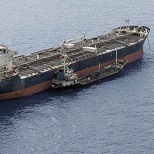Forwarder’s Liability for Cargo Loss and its Insurance in Ukraine PART 1
We have repeatedly tackled the issues relating to liability of Ukrainian freight forwarders. Thus, the problem of forwarder’s liability and that for the loss of cargo in particular, is not new. But life puts more and more problems. Recently, liability insurance of freight forwarders has become almost a must of the market, and customers prefer to contract only with those companies that insure their liability with a solid foreign insurance company.
The modern practice of the transport process organization often dictates the need for direct international multimodal transportation, and at that the contract of carriage is made by the freight forwarder as a multimodal transport operator, even though he does not directly own any vehicles. In addition, there is another trend, namely the merger of the carrier and forwarder in one. That means that the classic carriers diversify their activities by creating a forwarding unit within their companies, or freight forwarders acquire vehicles or create dependent carriers. Often forwarders attract subcontractors to perform the shipment. As a result, cases of shortage of goods and claims to insurers form quite a complicated relationship, with the analysis of which this article deals.
General provisions of the forwarder’s liability
Ukrainian legislation regulates Freight Forwarding activity and provides for grounds of Freight Forwarder’s liability. Law of Ukraine “On the freight forwarding activities” of 01.07.2004, the Civil Code (CC) of Ukraine, the Economic Code of Ukraine fix and regulate the relations on freight forwarding.
Thus, in accordance with Art. 1 of the Law “On the freight forwarding activities,” the contract of freight forwarding is a contract in which one party (freight forwarder) agrees for a fee and for the account of another party (the client) to perform or arrange for the performance of certain contract work related to transportation of goods. For the execution of certain works under the contract (transportation, storage, loading and unloading, etc.) the freight forwarder is entitled to involve other parties.
As far as freight forwarder’s liability is concerned Law of Ukraine “On the freight forwarding activity” includes only general provisions under which the freight forwarder is liable to the customer for the number of packages, weight (if check weighing was conducted in the presence of the carrier and confirmed with his signature), requirements to packaging according to related shipping documents signed by a representative of the carrier, unless otherwise provided by the contract of freight forwarding.
Issues of forwarder’s liability are also regulated by the general provisions of the Civil Code of Ukraine, which provide for liability for breach of obligations under the contract. Thus, Article 623 of CC of Ukraine fixes the obligation of a debtor who has violated the obligation to compensate the losses caused to the creditor. According to the Ukrainian legislation losses include the cost of lost, damaged or destroyed property, additional expenses incurred by a party that has suffered losses; unearned income (lost profits)
In the case third parties are involved by the freight forwarder to fulfill the obligations under the contract of freight forwarding in accordance with the provisions of the Law of Ukraine “On the freight forwarding activities” the freight forwarder is responsible for the actions and omissions of the third parties involved under the contract of freight forwarding in the same manner as for its own actions.
Ukrainian law lacks special rules that directly limit the liability of the freight forwarder to the client. This question is left to the parties by the legislator. Generally detailed regulation of freight forwarder’s liability to the customer, as well as grounds and limitations of liability are fixed by the parties in the contract of freight forwarding.
At the same time, the Ukrainian legislation contains general rules that enable the release of the freight forwarder of liability.
Thus, in accordance with Art. 614 of the Civil Code of Ukraine, the person who has violated the obligation is responsible if guilty (intently or negligently), unless otherwise agreed in the contract. The person is not guilty unless proves that it has taken all possible measures regarding the proper performance of its obligations.
In Ukraine common enough are disputes in connection with claims to freight forwarders due to loss of cargoes in transit, so the related court practice is quite ample. However, since the Ukrainian legislation provides only general provisions on liability of the freight forwarder, when dealing with such disputes the courts in Ukraine create ambiguous and contradictory practice. In particular, there are cases when under similar circumstances, the court finds a freight forwarder either liable or not for the loss of cargo during transportation.
In most cases, the courts’ conclusion regarding the presence / absence of freight forwarder’s liability for damages depends on several basic factors.
1. The nature of the forwarder’s obligations to the client and a way of engaging the carrier
While considering this category of disputes courts give great importance to the question of how relationships have been built between the freight forwarder and the carrier. If under the contract of carriage a forwarder acts on his own behalf, the liability to the client-cargo owner for the loss of cargo in transit rests with the freight forwarder. If the contract of carriage is made by a forwarding agent on behalf of and in the interests of the client, the responsibility for the loss of cargo, according to the courts, rests directly with the carrier. In such cases, the courts come to the conclusion that there is no liability of the freight forwarder as he properly fulfilled his obligation to arrange shipment (i.e. picked up the carrier, agreed on the route, and, acting on behalf and in the interest of the client, concluded a contract of carriage).
2. The volume of freight forwarder’s liability under the contract
As noted above, under the legislation of Ukraine the freight forwarder is responsible for a number of packages, weight, and packing fit according to the shipping documents signed by a representative of the carrier, unless otherwise provided by the contract of freight forwarding. Using this provision in the contract of freight forwarding, in practice, parties may both reinforce the forwarder’s liability and impose restrictions.
In particular, there are common definitions:
- Forwarder is fully liable for the safety of cargo from the moment of taking the same under his control up to the delivery of the cargo to the receiver";
- From the moment of loading the goods on the vehicle and to release of the same to the consignee the forwarder is fully liable for the safety of the cargo, its shortage or loss and indemnifies the customer for all or part of the value of the damaged goods, or the amount by which the value of goods decreased."
If any such provisions are available in the contract of freight forwarding and there are transport documents evidencing the fact of the goods transfer to the freight forwarder (or the carrier involved by the forwarder), the courts tend to come to a conclusion about the freight forwarder’s liability for the loss or damage to cargo;
3. Availability of all the elements required for civil liability
Considering the disputes related to the loss of goods in transit, the courts in their decisions often point to the fact that for a decision on recovery of damages the court must be provided with the proof of the whole set of elements of violation, namely:
- The presence of losses. The occurrence of losses and their size to be proved by the creditor / plaintiff;i
- Illegal actions, which are expressed in the improper performance by the freight forwarder of its obligations;
- Cause-and-effect relationship between the incurred losses and improper performance of obligations by the forwarder;
- Fault. Under Ukrainian law, the absence of guilt is the ground for exemption from liability, and the fact that there is no guilt is proved by a person who has violated the obligation.
The absence of even one of these four classic elements of civil offence provides grounds for refusal to meet the claim to the freight forwarder.
The practical aspect
The lack of clear rules for freight forwarder’s liability in the law entails more than one interpretation of these rules by the judiciary. The basic meaning the courts pay to the statements of the contract of freight forwarding (whether the freight forwarder’s liability is limited, if the freight forwarder has a commitment to safety of goods in transit, as the carrier was involved, etc.).
A few years ago, common practice took place, according to which the courts had refused to meet claims against forwarders, motivating their decisions by saying that the forwarders accepted liability only for arrangement of the transportation of cargo. This position was reinforced by the fact that the contracts for transportation were concluded by the freight forwarder not on his behalf but on behalf of the client-cargo owner. However, recently in most cases the courts tend to take the position of the cargo and assign the forwarder full responsibility for the losses caused to the client by shortage of cargo during transportation.
When claiming a forwarder a cargo owner must prove: the existence of the contractual relationship with the freight forwarder, the acceptance of the cargo by the freight forwarder under his control, the fact of attracting the carrier by the freight forwarder, the fact of damages during transportation of cargo.
Analysis of recent court practice suggests that, even with the standard conditions of contract (without increasing the responsibility of the freight forwarder) courts often come to the conclusion on liability of the forwarder. This is because freight forwarders increasingly give to their clients their own transport document — a bill of lading or invoice. For example, the bill of lading FIATA (F?d?ration Internationale des Associations de Transitaires et Assimil?s — International Federation of Freight Forwarders Associations). In this case, the freight forwarder shall act independently as a principal, taking thus the responsibility of the carrier for the whole transportation, including that for the loss of goods in transit, regardless of where the fact of loss occurred.
The contract of freight forwarding is often provided to regular customers for organization of freight forwarding services (FS contract). Under the FC contract the freight forwarder undertakes to provide or arrange for the provision of freight forwarding services related to the organization of transportation or providing transportation of goods in containers to the customer by sea, by road, rail or air transport. The organization of the cervices by the forwarding agent is performed on the basis of the customer’s application. On the basis of such an application a particular type of the freight forwarding contract is determined. Variations of legal nature of such a contract are extremely diverse. As already noted, the freight forwarder can act both as a grantor (the principal) and as an agent, including attorney and commission agent, and Del credere agent in particular.
Alexander Chebotarenko for forwarderlaw.com
(1).png)
Cargo transportation by sea is one of the most reliable and most expensive methods of goods delivery worldwide. Sea lines are one of...

A NEW INITIATIVE BY THE MINISTRY OF TRANSPORT AND INFRASTRUCTURE The new regulation that entered into force in 28 April 2021 has impo...

Dear colleagues, Here is Quarterly Shipping newsletter broght to you by Interlegal. Let us present the most valuable cases and n...

The issue of the port and berth safety is among those which raise various disputes between the interested parties. As the reasons for declar...

Although travel restrictions are beginning to ease, there are still restrictions in many countries impacting on crew changes. The new clause...
 Ship arrest in Ukraine: new approaches2020.06.18
Ship arrest in Ukraine: new approaches2020.06.18The concept of one shipowner – one vessel The concept of one shipowner – one vessel arose due to shipowners’ reasonable desire to secure...

Task The Client – large bunkering company making business in Black Sea Region – applied to Interlegal for debt recovery for bunker supply...

Dear Interlegal clients, Please be informed that in the third quarter of the 2019 year significant changes of Ukrainian legisla...

A presidential decree has been published in the official gazette on 03.05.2019 marking the date on which the 1999 Convention officially beca...
 LMAA arbitration notice clause2019.02.27
LMAA arbitration notice clause2019.02.27The LMAA has published a clause for use in arbitration agreements to facilitate effective notice by email (including for commencement of arb...




 Odessa, 65014, Ukraine, 1 а, Gretska St
Odessa, 65014, Ukraine, 1 а, Gretska St
